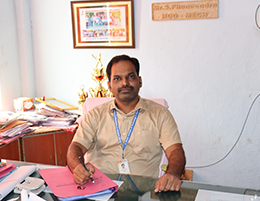
Department of Mechanical Engineering
Mechanical Engineering DepartmentEstablished in 2002-03 with an initial intake of 60 students (including 6 lateral entry), the Department of Mechanical Engineering boasts a strong foundation of well-qualified and experienced faculty and dedicated support staff. Specializations within the department encompass a diverse range of technological areas.
The department is well-equipped with modern laboratories, including:
- • Thermal Engineering Lab
- • Metallurgy & Instrumentation Lab
- • Heat Transfer Lab
- • Machine Tools & Metrology Lab
- • CAD/CAM Lab
- • Fluid Machines & Hydraulic Machines Lab
- • Mechanics of Solids Lab
- • Workshop
All laboratories are supported by 24/7 power supply. Furthermore, the department provides conducive learning environments with two well-furnished e-classrooms for theoretical instruction and a fully equipped seminar hall and project laboratory.
To foster a holistic learning experience, the department organizes various activities such as seminars, workshops, and social events through the National Service Scheme (NSS). These initiatives aim to enhance student interaction, encourage exploration beyond the classroom, and cultivate a sense of social responsibility.
The primary objective of the department is to prepare graduates who are not only successful in various technological advancements within the engineering domain but also capable of pursuing higher studies in Mechanical Engineering at a competitive global level
The Department of Mechanical Engineering has achieved significant recognition with the accreditation of its undergraduate program by the National Board of Accreditation (NBA).
- To excel in preparing mechanical engineering graduates with core knowledge, advanced skills and professional ethics in order to meet the ever changing industrial demands and social needs.
Vision

- M1: To provide the students with the best of knowledge by imparting quality education in the area of Mechanical Engineering and allied fields.
- M2: To facilitate the students by providing the interaction with Mechanical Engineering related companies to be part of technological advancements which enhances employment opportunities.
- M3: To inculcate self learning abilities, leadership qualities and professional ethics among the students to serve the society.
Mission



HOD Profile
Mr. L. Radhakrishna serves as the Head of the Department of Mechanical Engineering at Balaji Institute of Technology & Sciences, located in Narsampet, Warangal, Telangana. He completed his undergraduate studies in Mechanical Engineering at a college affiliated with Jawaharlal Nehru Technological University (JNTU). Furthermore, he obtained a Master's degree in CAD/CAM from Osmania University and is currently pursuing a Ph.D. at the same institution. He possesses a wealth of expertise in various domains, including teaching, design software, and mechanical engineering with over 12 years of experience in the teaching profession. He has a notable track record of organizing and participating in numerous workshops, conferences, and Faculty Development Programs (FDPs). Additionally, he has authored 15 Publications and one patent. His academic contributions extend to supervising four M. Tech projects and overseeing twenty B. Tech projects showcasing his dedication to teaching and motivating students to engage in real-time projects that benefits society. His primary research interests lie in the fields of Design and Robotics.

Mr. L. Radhakrishna
HOD






Programs Outcomes
- Engineering knowledge: Apply the knowledge of mathematics, science, engineering Fundamentals and an engineering specialization to the solution of complex engineering problems.
- Problem analysis: Identify, formulate, review research literature, and analyze complex Engineering problems reaching substantiated conclusions using first principles of Mathematics, natural sciences, and engineering sciences.
- Design/development of solutions: Design solutions for complex engineering problems and design system components or processes that meet the specified needs with appropriate consideration for the public health and safety, and the cultural, societal, and environmental considerations.
- Conduct investigations of complex problems: Use research-based knowledge and research methods including design of experiments, analysis and interpretation of data, and synthesis of the information to provide valid conclusions.
- Modern tool usage: Create, select, and apply appropriate techniques, resources, and modern engineering and IT tools including prediction and modelling to complex engineering activities with an understanding of the limitations.
- The engineer and society: Apply reasoning informed by the contextual knowledge to assess societal, health, safety, legal and cultural issues and the consequent responsibilities relevant to the professional engineering practice.
- Environment and sustainability: Understand the impact of the professional engineering solutions in societal and environmental contexts, and demonstrate the knowledge of, and need for sustainable development.
- Ethics: Apply ethical principles and commit to professional ethics and responsibilities and norms of the engineering practice.
- Individual and team work: Function effectively as an individual, and as a member or leader in diverse teams, and in multidisciplinary settings.
- Communication: Communicate effectively on complex engineering activities with the engineering community and with society at large, such as, being able to comprehend and write effective reports and design documentation, make effective presentations, and give and receive clear instructions.
- Project management and finance: Demonstrate knowledge and understanding of the Engineering and management principles and apply these to one’s own work, as a member and leader in a team, to manage projects and in multidisciplinary Environments.
- Life-long learning: Recognize the need for, and have the preparation and ability to Engage in independent and life-long learning in the broadest context of technological Change.











